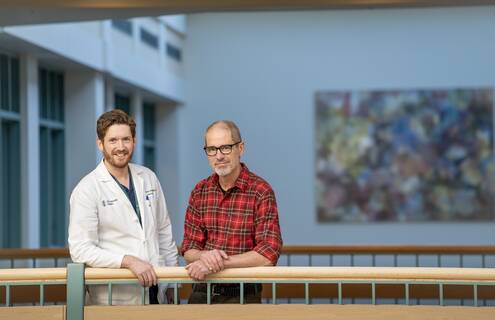
It’s nice to contribute to scientific knowledge, but also be able to offer rural patients the opportunity for meaningful multi-institutional trials.
Linton T. Evans, MDGilbert Stuart had already been through treatment for glioblastoma, an aggressive brain cancer. When his cancer came back, he knew what to expect. This time around, however, Gilbert learned that his care team is the first in New England to offer a therapy that would allow him to receive additional radiation without commuting to Dartmouth Hitchcock Medical Center every day for several weeks.
GammaTile therapy is an FDA-approved form of brachytherapy that eliminates the need for traditional radiation treatments. Instead, a neurosurgeon places a small chip pre-loaded with radiation precisely at the tumor site immediately after the tumor is removed. Over several weeks, the radiation is slowly released right where the tumor is most likely to come back. The focused delivery protects healthy tissue around the tumor site and also minimizes the side effects of external beam radiation, including hair loss.
Gilbert first heard about this newly available option from his neuro-oncologist, Amy M. Chan, MD, and neurosurgical oncologist Linton T. Evans, MD. “They explained that they could implant the GammaTile at the same time that they would be removing some other cancer,” recalls Gilbert. “It seemed like a win-win to do them both at the same time. My initial reaction was good.”
“This is a great and effective option for patients who have had progression of their tumor despite standard of care, or who are limited on options for really difficult-to-treat tumors,” says Evans. “Also, they can get their radiation treatment at the time of surgery. For people who have 2-hour drives to a rural cancer center like ours, coming back for one fraction of radiation, let alone multiple, can get difficult, particularly if they have neurologic impairments. Having everything done in the same surgery is really nice.”
Collaboration at its core
Identifying eligible patients is a discussion between multiple specialties, including neuro-surgery, neuro-oncology, and radiation oncology. “This is the first time I have been in an operating room with radiation oncologists and physicists,” says Evans. “At its core, this is a multi-disciplinary effort, which is great to engage in and a real strength of the Dartmouth Health system.”
The two patients Evans’ team has treated so far, including Gilbert, have come in the day of surgery, both had awake craniotomies for language mapping, both had the radiation implant and both went home the day after surgery. Evans expects that in a few weeks of recovery at home they should feel back to their usual selves. Evans’ team has proposed treating five patients per year but he is finding that patients are already asking about GammaTile brachytherapy, and choosing Dartmouth Cancer Center over other cancer centers in New England for this option.
Opening more doors with clinical trials
While brachytherapy with GammaTile already improves treatment options, currently, only patients with certain conditions of recurrent glioblastomas, aggressive meningiomas or brain metastases are eligible. It is also not for people who need emergency surgeries. GT Medical Technologies, the maker of GammaTile, is looking to open more doors by standing up multi-center clinical trials in which Dartmouth Cancer Center will be collaborating, in addition to joining a data registry of 50 sites as the only participant from New England.
Evans hopes to offer a trial for patients with recurrent glioblastomas, and a trial for patients with up-front brain metastases to supply more data for the use of GammaTile for initial treatment versus cancer that has come back again. “It’s nice to contribute to scientific knowledge, but also be able to offer rural patients the opportunity for meaningful multi-institutional trials,” says Evans.
A commitment to what matters most
There is no surgery required to remove the implant after the radiation has been delivered. Patients are able to get back to their normal lives with only regular follow-up surveillance and care as needed. “I’m glad I chose this procedure and hoping it will help me with the cancer as an option on top of the other measures my care team is taking,” says Gilbert.
Evans acknowledges Dartmouth Health’s commitment to being the first regionally to offer what is not an inexpensive procedure, because this is what a multi-disciplinary team feels is appropriate for patients who are running out of treatment options. “It’s one of the things that impresses me and makes me thankful to be at an institution where we can make the case to bring this on,” he says.